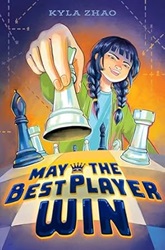
 May the Best Player Win
May the Best Player WinReview posted November 15, 2024.
G. P. Putnam's Sons, 2024. 225 pages.
Review written October 28, 2024, from a book sent to me by the publisher.
Starred Review
2024 Sonderbooks Stand-out:
#8 More Children's Fiction
May the Best Player Win is about a middle school student named May who loves playing chess. As the book opens, she wins a trophy for being the top girl player at the State Middle School competition.
That gets her lots of attention from her school, and even from the media - but also prompts some jealousy from her competition on her own team. She thought Ralph was her friend, and they tied at the competition, but he tells her she's not really that good and is only getting the attention because she's a girl. So that starts a bet between them over which one will be named team captain when they compete at Nationals.
Meanwhile, her school's doing a publicity campaign, and they pair May up with Mario, a soccer star, who turns out to be nice as well as athletic. But May needs to keep working on her chess game, and her friend Becca (who's also on the team) wants time with her, and the school schedules picture-taking with Mario. When May starts telling little white lies to keep her schedule straight, Becca feels hurt.
This book does a great job of portraying middle school concerns and middle school pressures. We're with May in her struggles to prioritize it all. And I like the natural way she gets to thinking about regaining her joy in playing chess that she had when she started playing at six years old, when she wasn't thinking so much about winning.
The book gives each chapter a title that's a chess term, with its definition, and they all fit remarkably well. It does a nice job of giving us the feel of what goes into being a serious chess player without getting lost in the details. It also felt like a genuine explanation of the game without hand-waving or magical abilities that just make the player "good" - I suspect because the author reveals at the back that she learned to play chess at six years old, like May - but later dropped out after encountering discrimination and criticism of girls and feeling pressured to win. I love that she's got May facing those same obstacles and overcoming. May this be true for more and more girls today.
I love her letter to the reader at the back of the book (and the story is strong enough to carry it), which ends like this:
I hope May's adventures inspire you to hold on to the joy of playing - in chess or in any activity you choose. Don't let the weight of expectations dim the sparkle of your love for the game. Don't let others tell you whether you are or aren't good enough, because the only thing that should matter is your passion and determination. So, keep playing, keep dreaming, and most importantly, enjoy every moment on and off the chessboard.
